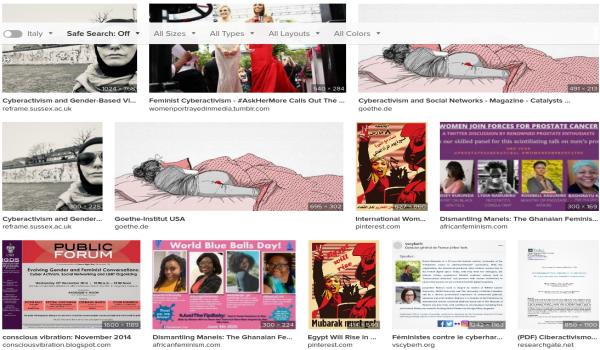Women vs (white-only) Big Tech and activism in Brazil
From the “Things You Need To Know About” department.
Today, I find useful to quote a few passages from a November 2020 interview to “Bárbara Paes, a young Brazilian feminist who works at the intersection of technology and social justice”. The interview covers many topics, but here I only quote from the part that most matches the scope of this website: digital divides, and divides in discussions, and funding of, digital social innovation.
The quotes are almost literal, only emphasis and minimal edits for clarity are mine. Images are screenshots of a DuckDuckgo image search for “feminist cyberactivism”.
Unlike almost any other post here, there is no comment from me this time, because this post has only two purposes. The first is to increase awareness that certain problems are real and should not be ignored, whatever one’s opinions on how to fix them may be. The other is to signal issues, and situations, of which I would like to know more. Thanks in advance for sending me further reading material on these topics.

“On Black feminist cyberactivists in Brazil and the neoliberalism of “women in tech”
(that is the actual title of the interview)
- Generally Black Women are excluded from discussions about how digital technologies are created
- Even in spaces that are supposedly progressive spaces, like the Internet Forum here in Brazil - there aren’t any Black women. They have denied the participation of many Black women for some years now… To bring younger women into these discussions, which sometimes seem very technical and restricted, is important.
- For us, it’s extremely clear how all of these large platforms, as tech companies, and the networks that we use, have been used as tools to reproduce white supremacy.
- For us… it’s extremely contradictory to think of a feminist initiative within technology that doesn’t look at the behavior and impact of certain [“Big Tech”] companies. For example, this is rather hard, but we never share job openings at certain companies.
- And more and more, it’s evident that these companies are not going to change - it doesn’t matter how many women are in them! It’s a fallacy.
- We are going to see groups of white women, who overall live in a very privileged context in Brazil, compete for funding with groups of Indigenous women, Black women, women who are at the base of the social pyramid in Brazil and who sustain Brazil, who don’t have other forms of funding.
- And if you look at who is working in the majority of the foundations in Brazil, they’re white.
- And this makes a difference when it comes to deciding who gets funding. Because the people who can write about their projects in a way that is more appealing to these foundations are white. More and more, non-White feminists in Brazil are going to have less access to funding.
Who writes this, why, and how to help
I am Marco Fioretti, tech writer and aspiring polymath doing human-digital research and popularization.
I do it because YOUR civil rights and the quality of YOUR life depend every year more on how software is used AROUND you.
To this end, I have already shared more than a million words on this blog, without any paywall or user tracking, and am sharing the next million through a newsletter, also without any paywall.
The more direct support I get, the more I can continue to inform for free parents, teachers, decision makers, and everybody else who should know more stuff like this. You can support me with paid subscriptions to my newsletter, donations via PayPal (mfioretti@nexaima.net) or LiberaPay, or in any of the other ways listed here.THANKS for your support!